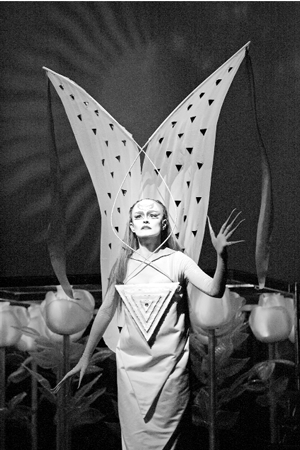Julie Taymor’s “Flute” sparkles; a commercialized Ring panders
The Metropolitan Opera’s rudderless revival of “Die Walküre” and a sparkling new production of “Die Zauberflöte” demonstrated last week just how important a role the stage director plays in operatic productions.
“Walküre” is of course part of Otto Schenk’s production of Wagner’s “Ring” cycle dating from the late 1980s, a staging that won a certain loyalty among reactionary opera fans with a penchant for Disney-like literal detail and utter avoidance of any philosophical content. When the show was new, it boasted such gifted singing actors as Hildegard Behrens and Peter Hofmann who brought their own dramatic conviction to the piece. More recently, the star has been James Levine’s handpicked orchestra that seemed all the more glorious against the scenic backdrop of gray immobility.
But for those of us who look for opera to be something more than gorgeous noise, this “Walküre” production is the worst sort of kitsch, not even tacky enough to achieve the level of camp. All we can hope for is that a singer now and then will arrive complete with personality and interpretation, the way 19th century divas traveled with trunks of their own costumes.
The only completely successful performance in this revival (heard October 9) was soprano Adrianne Pieczonka’s as Sieglinde, combining exquisite musicality and sensitive attention to the text with a sympathetic and graceful stage presence. Her silvery soprano sounded always perfectly in tune and projected effortlessly into the Met’s huge auditorium, even in the tricky low tessitura of Act One. The very top of the voice lacks superstar bloom, but otherwise she has everything. This is an artist I look forward to hearing again, soon and often.
A pleasure of a more guilty kind was soprano Olga Sergeeva (Brunnhilde). Yes, her intonation is less than reliable, and yes, she seems to have only the most general idea of what all those words mean. But you can say the same things about Jane Eaglen; at least Sergeeva brings enthusiasm to the role, an obvious joy in performing, and the most perfect physique du role imaginable. Even when she fell victim to The Dramatic Soprano’s Nightmare (dropping the spear during the introduction to the “Battle Cry”), Sergeeva never for a moment was anything less than the very image of a Teutonic goddess.
These two divas besides, there wasn’t much going on that afternoon. Plácido Domingo slouched about like Richard III and ran out of voice at the end of the first act; bass Mikhail Kit (Wotan) offered a rich, even voice but only the most basic stock notions of interpretation. The conducting of Valery Gergiev was exciting and fiery but erratic; time and time again stage and pit went off in their own directions.
Of course, the Julie Taymor production of “Die Zauberflöte” isn’t two decades old like “Walküre”; when I saw it on October 11 that was only the second night of the run. But I have a hunch this version will retain its sense of fun and wonder until well into the 2020s.
The director wisely chose to stage the principal performers with utmost simplicity, mostly keeping them well downstage and facing the audience, brightly lit (by Donald Holder) so that every gesture and facial expression carried into the theater. The more complicated action Taymor assigned to a black-clad movement corps who wielded puppets representing everything from giant polar bears to the swirling moth-like wings encircling the Queen of the Night on her first entrance.
A particularly witty highlight was the Ziegfeld-style parade of showgirls in stylized bird costumes who joined Papageno for a razzle-dazzle account of his second act aria. In fact, many of the lighter moments of the opera took on a Broadway air. The little ballet of Monastatos’s slaves to Papageno’s bells was both the most precise and funniest I have ever seen.
Was this a flawless production? No. After the many visual treats lavished on relatively unimportant scenes, the staging for the climactic “Trials of Fire and Water” underwhelmed, consisting as it did of nothing more than an elevator ride behind a few chiffon curtains. But this is a quibble. The show can be rightfully called a triumph, and word of mouth has already declared it a hot ticket.
Leading a luxurious cast were Matthew Polenzani (Tamino) and Dorothea Röschmann (Pamina), healthy lyric voices in excellent form. Röschmann’s is perhaps the more interesting instrument, complex and rich with more than a hint of the velvet we associate with the young Renée Fleming.
The young Russian baritone Rodion Pogossov predictably made little of Papageno’s lengthy spoken dialogue, but he’s musical and (more importantly in this role) a natural clown. As Sarastro, Kwangchul Youn sang pleasantly but without much heft on low notes. Soprano L’ubica Vargicova flubbed the highest notes of the “Queen of the Night” and ran out of breath during the triplets in her second aria.
As with last week’s “Otello,” James Levine was at his very considerable best, leading his orchestra in an expansive and richly romantic reading of Mozart’s score. To quibble just once more, might I suggest he reconsider that too-swift tempo for the second act quintet which left his Three Ladies gabbling?
James Jorden is the editor of parterre box, the queer opera zine (parterre.com)



































